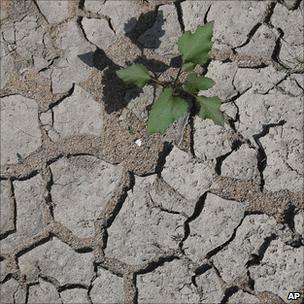Ministers bid to stem nature loss
- Published

More UK ecosystems are in decline than are improving, recent research showed
The government has published proposals aimed at curbing loss of nature across England and strengthening links between people and the wild.
The Natural Environment White Paper, external aims to put a value on nature, and use economic levers to conserve it.
Communities will be able to preserve green space they consider valuable.
The government will establish accounts of "natural capital", to sit beside GDP and the new index of well-being as markers of society's health.
Last week, the National Ecosystem Assessment (NEA), external concluded that nature was worth billions of pounds to the UK each year through providing "ecosystem services" such as clean water, pollination and fertile soil.
Environment Secretary Caroline Spelman said society would pay a "terrible price" if it neglected to care for nature.
"Nature belongs to us all, and we've all got a vested interest in protecting it," she said.
"That's why the true value of nature should be built into the decisions we make - as individuals, organisations, businesses and governments - so that we become the first generation to leave the environment in a better condition than we found it."
The NEA found that 30% of the ecological zones across the country were in decline, with only 20% improving.
Capital idea
The new ecological accounts will be prepared by a Natural Capital Committee that will report to the cabinet Economic Affairs Committee, chaired by Chancellor George Osborne.
Lord Deben - former Environment Secretary John Gummer - who has advocated the use of natural capital accounting for years, described the plans as "sensible and practical", following to some extent the model of the Committee on Climate Change (CCC), the government's statutory advisers.
"You set up an independent committee, and that ensures accounting is done properly, not twisted for some party political reason," he told BBC News.
"It doesn't have the statutory place that the CCC has - but if you have an independent committee charged with making these recommendations, it's very difficult for the government not to accept their advice.
"We are the first major country to do this, and it does put Britain in the lead on biodiversity and the natural world."
Protection payments
The White Paper calls for the establishment of 12 Nature Improvement Areas in places where ecological health has been degraded.
Public funding of £7.5m is available to kick-start their development. But businesses and community groups are expected to raise additional money and lead the process.
NIAs are intended to meet a criticism contained in a government-commissioned report, Making Space for Nature.
Published last year, it found that the existing network of protected areas was too fragmented and failed to offer long-term stability and protection to wildlife.
In addition, Local Natural Partnerships will be established to improve co-ordination between agencies, with an initial £1m available.
Businesses will be encouraged to buy "biodiversity offsets" when their activities impact on nature.
This will involve them paying for enhancement, probably in a neighbouring area.
But offsetting will not be compulsory, as some lobby groups had advocated. Instead, voluntary schemes will be piloted over the next three years.
Shadow environment secretary Mary Creagh suggested the White Paper was short on detail, and provided "few clues" about government plans.
"It fails to set out a clear plan for major challenges such as reforestation or biodiversity loss, or deal with concerns about planning policy," she said.
"The government needs to do better if it wants the public to believe it has the best interests of nature at heart."
Although conservation organisations have largely welcomed the White Paper, some have also called for the government to be more specific.
"There is much to welcome in this White Paper: it's the first of its kind for 20 years in England, and we are pleased its recognises woods and trees as cost-effective vehicles for delivering a range of services to society," said Sue Holden, chief executive of the Woodland Trust.
"What it lacks, however, is a tree planting target for England. All other parts of the UK have set a planting figure, so why not England?
"We need an ambitious target and a timetable for action, to match the scale of the challenge in one of the least wooded countries in Europe."
Testing time
Other measures in the White Paper include:
an 80% increase in funding for the Higher-Level Stewardship Scheme, which rewards farmers for wildlife-friendly management
establishment of a Green Economy Council and an Ecosystem Market Taskforce, linking business interests to ecological health
eliminating the use of peat in horticulture by 2030.
The paper also includes tweaks to planning regulations, although more profound reforms are to follow.
Unsustainable use of water, meanwhile, will receive further attention in another White Paper due out later this year.
"In many ways, publishing the White Paper was the easy part; now the real challenge begins," commented Paul Wilkinson, chair of Wildlife and Countryside Link, an umbrella group representing 35 conservation organisations across the UK
"Driving forward the many commitments set out within the White Paper will need the active support and involvement of departments across government, and strong leadership from No 10."
- Published2 June 2011
- Published2 June 2011
- Published6 January 2011
- Published13 July 2010